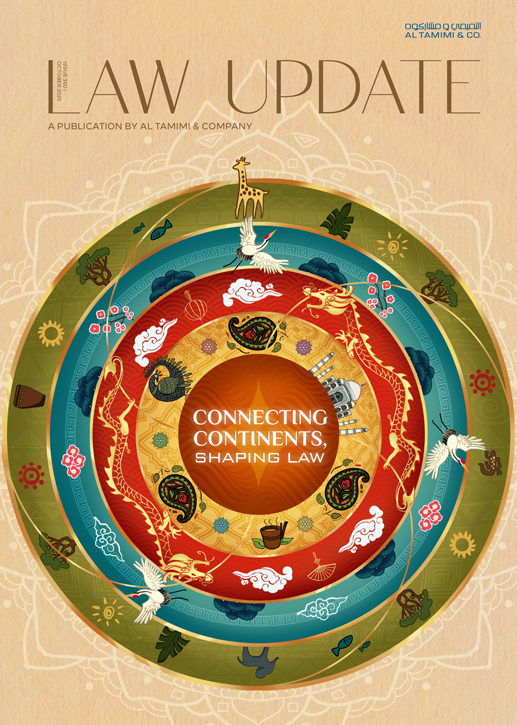- Arbitration
- Banking & Finance
- Capital Markets
- Commercial
- Competition
- Construction & Infrastructure
- Corporate / Mergers & Acquisitions
- Corporate Services
- Corporate Structuring
- Digital & Data
- Dispute Resolution
- Employment & Incentives
- Family Business & Private Wealth
- Innovation, Patents & Industrial Property (3IP)
- Insurance
Find a Lawyer
Book an appointment with us, or search the directory to find the right lawyer for you directly through the app.
Find out more
Africa & Asia
Connecting Continents, Shaping Law
This month, our focus turns to Africa and Asia, two regions reshaping global growth and investment. From Egypt’s ongoing legal and economic reforms and the strengthening of UAE–Moroccan relations, to the rise of Korean investment across the Middle East, this issue highlights the developments driving change across these markets.
We also explore the UAE’s role as a bridge between regions – a hub for private wealth management, dispute resolution, and cross-border collaboration, connecting businesses and investors across Africa and Asia. The articles in this edition offer practical insights into how these shifts are influencing trade, regulation, and market confidence across the wider region.


2025 is set to be a game-changer for the MENA region, with legal and regulatory shifts from 2024 continuing to reshape its economic landscape. Saudi Arabia, the UAE, Egypt, Iraq, Qatar, and Bahrain are all implementing groundbreaking reforms in sustainable financing, investment laws, labor regulations, and dispute resolution. As the region positions itself for deeper global integration, businesses must adapt to a rapidly evolving legal environment.
Our Eyes on 2025 publication provides essential insights and practical guidance on the key legal updates shaping the year ahead—equipping you with the knowledge to stay ahead in this dynamic market.
The leading law firm in the Middle East & North Africa region.
A complete spectrum of legal services across jurisdictions in the Middle East & North Africa.
-
Practices
- All Practices
- Banking & Finance
- Capital Markets
- Commercial
- Competition
- Construction & Infrastructure
- Corporate / Mergers & Acquisitions
- Corporate Services
- Corporate Structuring
-
Sectors
-
Country Groups
-
Client Solutions
Today's news and tomorrow's trends from around the region.
17 offices across the Middle East & North Africa.
Our Services
 Back
Back
-
Practices
- All Practices
- Banking & Finance
- Capital Markets
- Commercial
- Competition
- Construction & Infrastructure
- Corporate / Mergers & Acquisitions
- Corporate Services
- Corporate Structuring
- Digital & Data
- Dispute Resolution
- Employment & Incentives
- Family Business & Private Wealth
- Innovation, Patents & Industrial Property (3IP)
- Insurance
- Intellectual Property
- Legislative Drafting
- Private Client Services
- Private Equity
- Private Notary
- Projects
- Real Estate
- Regulatory
- Tax
- Turnaround, Restructuring & Insolvency
- Compliance, Investigations and White-Collar Crime
-
Sectors
-
Country Groups
-
Client Solutions
Landmark Dubai Court Decisions Signal Pro-Enforcement Stance for Foreign Judgments
Al Tamimi & Company successfully secured the recognition and enforcement in Dubai of a judgment of the English High Court of Justice. Significantly, the English judgment was a summary judgment, which is a judgment issued by way of an interlocutory application and without a full trial. The Dubai Courts issued the recognition and enforcement order within one business day of filing.
The above decision follows a welcome recent judgment of the Dubai Court of Cassation confirming the recognition and enforcement of another English Court judgment in the UAE. Importantly, the Dubai Court of Cassation determined that the requirement of reciprocity in enforcement is established between the English Courts and the UAE Courts.
These landmark decisions appear to signal a shift in the practice of the Dubai Courts, which is becoming a pro-enforcement forum, particularly with regard to enforcement and recognition of English judgments.
Several prior decisions and circulars have played a significant role in paving the way for the achievement of these pivotal legal milestones. For example, on 21 May 2021, the English Court of Appeal in Lenkor Energy Trading DMCC v Puri [2020] EWHC 75 confirmed the recognition and enforcement of a Dubai Court judgment in England. The Court of Appeal agreed that the Dubai Court judgment was final and conclusive, and issued by a court of competent jurisdiction (see our law update article on Lenkor here).
Following the Lenkor decision, on 13 September 2022, the UAE Ministry of Justice (“MOJ”) issued a circular opining that a precedent has been established by the Courts of England and Wales in respect of recognition and enforcement of judgments of the UAE Courts. The MOJ took the view that the previously elusive UAE requirement for ‘reciprocity in enforcement’ (which would allow for English judgments to be enforced in the UAE under the UAE Civil Procedure Code), has now been satisfied (see our law update article on the MOJ circular here).
In addition, in a recent decision, the Dubai Court of Cassation has accepted the enforcement of a Canadian summary judgment. In that decision, the Court properly identified the distinction between interim orders, which do not dispose of a claim on the merits, and summary judgments, which do. We look forward with anticipation to further developments in respect of judgments from other jurisdictions.
How can we help?
Should you have any questions or require further clarification on these matters, please do not hesitate to contact Naief Yahia, Rita Jaballah, Mosaab Aly, and Mahmoud El Tantawy.
Key Contacts
Stay updated
To learn more about our services and get the latest legal insights from across the Middle East and North Africa region, click on the link below.


